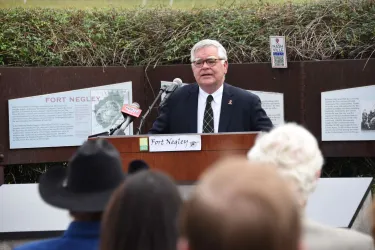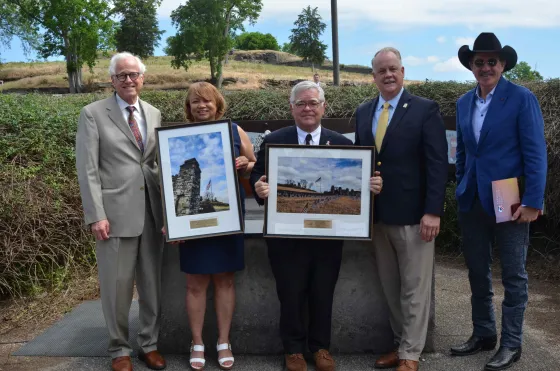Mayor Cooper, Preservation Advocates Lauded for Steadfast Efforts to Protect Nashville's Fort Negley
Mary Koik, (202) 367-1861 x7231
(Nashville, Tenn.) — Although it dates to the Civil War, Nashville’s Fort Negley did not play a decisive role in the city’s namesake engagement during that conflict. Instead, it has faced 21st-century battles, as the focus of controversial plans that pitted conflicting visions for a growing city against an iconic place integral to its past. Gathered on those heights overlooking the city, at the outset of its Annual Conference, the American Battlefield Trust presented both Mayor John Cooper and the African American Cultural Alliance of Nashville with its prestigious Preservation Legacy Award in recognition of their stalwart commitment to the site’s integrity.
The announcement follows on the heels of Tuesday’s Metro Nashville Council meeting in which that body passed a resolution “affirming the protection of Fort Negley” and pledging the site will now be devoted to “educational purposes, archeological research, historic interpretation, and public park uses and shall not be developed for any purpose other than those proposed in the 2022 Fort Negley Master Plan.”
“The mission of the American Battlefield Trust is predicated on the ‘power of place,’ an idea powerfully encapsulated by Fort Negley,” said organization President David Duncan. “Standing here, the pull of the past is inescapable – the way that this place has resonated with generations, gaining new layers of significance. We owe a debt to those who have led the way in advocating on its behalf, especially Mayor Cooper and the African American Cultural Alliance.”

During the 2019 mayoral election, John Cooper pledged to champion Fort Negley, then-lately embroiled in a development controversy that had prompted Historic Nashville, Inc., to focus its annual endangered list, the Nashville Nine, down to the Nashville One. The Trust and the Cultural Landscape Foundation were among the national organizations that also lent support to the cause and, eventually, the plan was scrapped.
“It has been an honor to advocate for the ongoing protection of Fort Negley throughout my time in public office,” said Mayor Cooper. “Fort Negley offers an irreplaceable, invaluable window into our history, and allows us to gaze into our past with courage, examine our flaws, and plan a brighter, better future for all. Its preservation is a victory for everyone.”
More recently, concerns arose when the neighboring Adventure Science Center announced plans to plant an arboretum on land it leases from Metro Parks — an area that archaeological surveys indicate may include unmarked Civil War-era graves. The African American Cultural Alliance was at the forefront of efforts, supported by the Civil War history and preservation communities, to negotiate a compromise solution.
“Watching so many people and groups unite in a shared cause has been remarkable,” said Jeneene Blackman, CEO of the African American Cultural Alliance. “Raising up the story of Fort Negley for the entire city, state and country has uplifted us all.”
Although the damaging proposals were circumvented, those threats and the response to them elevated public appreciation for and understanding of Fort Negley’s place in Nashville’s historical narrative. It is this type of lasting change that the Trust honors with its Preservation Legacy Award, a recognition given only periodically and for extraordinary merit, as opposed to an annual occurrence.
“Today, after being in a defensive position for over a century and a half, we stand at the point of moving forward to create a site of remembrance, education, interpretation, and to realize the hope of many who made their way here from the plantations, seeing Nashville, and this hill, as a beacon of hope for the future,” said Friends of Fort Negley Park President Cyril Stewart.
It is in this atmosphere that the Metro Council has approved a budget that includes $17 million for Fort Negley, including funds to repair damaged masonry, to begin implementation of Phase One of an ambitious master management plan and, alongside allies, acquire additional historic properties to add to the park. During the May 16 meeting of the Metro Nashville Council, members adopted a resolution declaring Fort Negley “more than a Civil War Relic … [it] presents the unique opportunity to interpret history from the Civil War to the Civil Rights movement at one location” and setting guidelines that all future development should adhere to the master plan’s vision.

“Supporting the type of collaborative public-private partnerships so evident here at Fort Negley is the very reason that the Tennessee Civil War Sites Preservation Fund was created,” said Nina Scall, program director of the Tennessee Wars Commission. “We look forward to joining with many of the groups gathered today in being part of the next chapter for this exceptional place.”
Fort Negley, atop St. Cloud Hill, south of Nashville, is all that remains of the Union defenses that once encircled the city. The labor was largely performed by the formerly enslaved who flocked to contraband camps near Federal lines and were pressed into the harsh service; up to 800 of the nearly 3,000 laborers employed in the process died and it is likely that their remains still lie in the grounds of Fort Negley Park. Eventually, the finished fort was defended by regiments of United States Colored Troops. In recognition of this important narrative, Fort Negley is the first American site nominated for the United Nations Educational Scientific and Cultural Organization (UNESCO) Slave Route Project.
After the Civil War, many of those who built and manned Fort Negley stayed in the immediate vicinity, building what became known as the “Bass Street Community,” Nashville’s first post-Emancipation free Black neighborhood. That veteran-created community and its descendants lasted until the 1950s, when urban renewal and the building of Interstate-65 forced them out. However, Fort Negley remains a touchstone of the city’s Black community.
“For long years, it was assumed that evidence of those layers of significance had been lost,” said Dr. Angela Sutton, director of the Fort Negley Descendants Project and an assistant dean in Vanderbilt University’s college of arts and sciences. “But with the help of descendants, modern technology and fresh eyes, we are able find that story still embedded in the landscape.”
The American Battlefield Trust is dedicated to preserving America’s hallowed battlegrounds and educating the public about what happened there and why it matters today. The nonprofit, nonpartisan organization has protected more than 56,000 acres associated with the Revolutionary War, War of 1812 and Civil War across 155 sites in 25 states. Learn more at www.battlefields.org.
###


